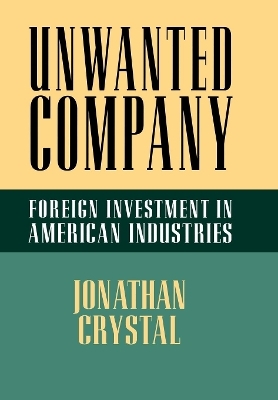
Unwanted Company
Foreign Investment in American Industries
Seiten
2003
Cornell University Press (Verlag)
978-0-8014-4123-3 (ISBN)
Cornell University Press (Verlag)
978-0-8014-4123-3 (ISBN)
- Lieferbar (Termin unbekannt)
- Versandkostenfrei
- Auch auf Rechnung
- Artikel merken
In the last quarter century, the U.S. economy has been transformed by a large inflow of direct investment from abroad. Foreign companies, mainly from Europe and Japan, have built factories and acquired U.S. firms at an ever-increasing rate. Jonathan...
In the last quarter century, the U.S. economy has been transformed by a large inflow of direct investment from abroad. Foreign companies, mainly from Europe and Japan, have built factories and acquired U.S. firms at an ever-increasing rate. Jonathan Crystal finds inconsistencies in how American businesses have responded to this globalization of production.
U.S. firms, especially multinationals, have conflicting interests regarding investment protection, Crystal shows. Many American firms, under siege from overseas competitors, have already expended considerable energy in obtaining trade protection, but they are competing not only with foreign imports but also with locally established foreign-owned firms. American businesses may favor stricter regulation of foreign companies that threaten their bottom line, but they also consider their own interests as global investors subject to retaliatory protection in other countries. Restrictions on "foreign" investment, it seems, are not so attractive when they are imposed by other countries.
Unwanted Company examines the different ways in which important U.S. industries (including semiconductors, automobiles, steel, consumer electronics, telecommunications, and airlines) reacted to this new challenge. It focuses on the political responses of U.S.-owned firms to how Washington ought to regulate foreign direct investment and how it ought to treat foreign-owned firms in the United States. Some industries welcomed (or at least didn't oppose) foreign investment, whereas others sought restrictive and discriminatory policies. Crystal demonstrates how the nature of the domestic political environment shapes the translation of economic interests into policy preferences.
In the last quarter century, the U.S. economy has been transformed by a large inflow of direct investment from abroad. Foreign companies, mainly from Europe and Japan, have built factories and acquired U.S. firms at an ever-increasing rate. Jonathan Crystal finds inconsistencies in how American businesses have responded to this globalization of production.
U.S. firms, especially multinationals, have conflicting interests regarding investment protection, Crystal shows. Many American firms, under siege from overseas competitors, have already expended considerable energy in obtaining trade protection, but they are competing not only with foreign imports but also with locally established foreign-owned firms. American businesses may favor stricter regulation of foreign companies that threaten their bottom line, but they also consider their own interests as global investors subject to retaliatory protection in other countries. Restrictions on "foreign" investment, it seems, are not so attractive when they are imposed by other countries.
Unwanted Company examines the different ways in which important U.S. industries (including semiconductors, automobiles, steel, consumer electronics, telecommunications, and airlines) reacted to this new challenge. It focuses on the political responses of U.S.-owned firms to how Washington ought to regulate foreign direct investment and how it ought to treat foreign-owned firms in the United States. Some industries welcomed (or at least didn't oppose) foreign investment, whereas others sought restrictive and discriminatory policies. Crystal demonstrates how the nature of the domestic political environment shapes the translation of economic interests into policy preferences.
Jonathan Crystal is Associate Professor of Political Science, Fordham University.
The challenge of incoming foreign direct investment; Political responses to foreign investment; An economic response - consumer electronics and steel; An ambivalent response - semiconductors and automobiles; A liberal response - machine tools and antifriction bearings; A strategic response - airlines and telecommunication services.
| Erscheint lt. Verlag | 22.7.2003 |
|---|---|
| Verlagsort | Ithaca |
| Sprache | englisch |
| Maße | 152 x 229 mm |
| Gewicht | 907 g |
| Themenwelt | Sozialwissenschaften ► Politik / Verwaltung ► Politische Theorie |
| Sozialwissenschaften ► Soziologie | |
| Wirtschaft ► Volkswirtschaftslehre ► Mikroökonomie | |
| ISBN-10 | 0-8014-4123-4 / 0801441234 |
| ISBN-13 | 978-0-8014-4123-3 / 9780801441233 |
| Zustand | Neuware |
| Haben Sie eine Frage zum Produkt? |
Mehr entdecken
aus dem Bereich
aus dem Bereich
ein Vortrag
Buch | Softcover (2024)
Suhrkamp (Verlag)
CHF 13,95
Geschichte, Vordenker, Organisationen
Buch | Softcover (2023)
C.H.Beck (Verlag)
CHF 18,90


